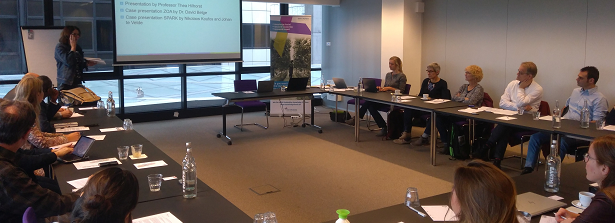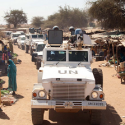Supporting transitions towards market-based agriculture in fragile settings

What development interventions are effective in fragile settings and how can market-based agricultural and food security interventions better link up with humanitarian, rehabilitation and resilience programming? This was the central topic of the latest meeting of the Community of Practice on food security and stability on May 6, 2019. A group of practitioners, policymakers and researchers came together in a small setting to jointly identify approaches currently taken to promote (transitions towards) market-based agricultural development in fragile settings. Participants then identified challenges faced and opportunities to further promote these activities.
| Documents to download |
|
The meeting featured presentations by Professor Thea Hilhorst, International Institute of Social Studies (ISS); Nikolaos Koufos, SPARK (see PowerPoint); and Johan te Velde, Double Loop (see PowerPoint). On the one hand these presentations highlighted the uncertainty of working in fragile settings. SPARK interventions were effective, but still interrupted and more costly due to ongoing conflicts for instance. A change in strategy was needed during the programme, meaning that initial context analyses were outdated fairly quickly. But on the other hand, the presentations also highlighted that these settings are more rationally organized than is often assumed. Thea Hilhorst noted that for instance many people living in fragile settings are resilient through their own efforts; by seeking out champions and not being afraid to work with people that can get things done, impact can be achieved.
Group discussions
After the presentations participants split up into two groups. One group discussed how humanitarian, recovery and resilience programming can more effectively look towards integration with long-term (agricultural) development programming. The other group discussed how agribusiness and agricultural value chain interventions can be effectively promoted in fragile settings.
When discussing current challenges for implementing nexus approaches to integrate humanitarian and development programming in agriculture, participants all agreed that a key bottleneck was the siloed approach of donors. Funding instruments are still separated, which reflects siloed ways of working within donor institutions. Participants agreed that policymakers should fully implement the New Way of Working promoted by the UN and the commitments of the Grand Bargain. Ensuring that planning was done jointly was another key way in which programmes can implement the humanitarian-development(-peace) nexus, which could be achieved when practitioners set common goals with organizations that work in the same geographical area.
In the discussions on how to effectively implement agribusiness and value chain interventions in fragile settings a key recommendation was to be realistic about what can be achieved and to be wary of trying to do too much. In stable environments plans are often already very ambitious, so one should be careful with the Dutch attitude and ambitions relying on “maakbaarheid” (the ability to engineer positive change) for which there is actually limited room. This means that policy frameworks focusing on root causes are in danger of being overly ambitious.
Key recommendations
The workshop resulted in a number of concrete recommendations that can be taken on board by practitioners and policymakers, as well as learning questions to develop future activities with the Community of Practice. Key recommendations are listed here:
Group 1: How can humanitarian, recovery and resilience programming more effectively work towards integration with long-term (agricultural) development programming?
- Key action for policymakers: To achieve a joined up approach between the worlds and objectives of development, humanitarian aid and peacebuilding (triple nexus) fully commit to the goals of the Grand Bargain and New Way of Working.
- Key action for practitioners: In the entire programming process think about how operational choices will determine the ability of programmes to link up and integrate in the humanitarian-development nexus.
- Key learning question/activity: Besides collecting and sharing evidence from evaluations and MEAL systems, also monitor impacts beyond direct beneficiaries and the end of programmes, revisit and make accessible existing research, for instance to see what (humanitarian) activities can support market systems.
Group 2: How are agribusiness and agricultural value chain interventions effectively implemented in fragile settings?
- Key action for policymakers: Try to link up with local initiatives and local people already present on the ground.
- Key action for practitioners: Focus support on cooperatives and build on the people and initiatives that are already present in a context.
- Key learning question/activity: How can we work towards resilient communities, taking into account the need for scaling and an integrated or coordinated approach?
For a full list and detailed description of all presentations and discussions, please see the full workshop report.






